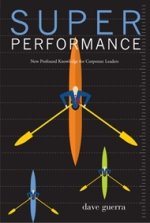Saturday, August 2, 2008
Transformation to Superperformance
We cannot become what we need to be by remaining what we are.
Max DePree
Superperformance is available to all, but it requires transformation to a new state. This is the same kind of comprehensive change that occurs when water turns to ice. Transformational changes of this type abound throughout nature - the epidemic transmission of a virus, the critical mass of a runaway social trend, metamorphosis of a caterpillar into a butterfly, and even certain emotional changes, like the process of falling in love. The change is comprehensive and dramatic. This is called a phase transition, a state change that occurs without altering a system’s underlying chemical composition. Phase transitions are sudden, non-linear, and system-altering. The physics of a phase transition are analogous to transformational change in other systems, including social ones. In a phase transition, as the energy, temperature or information passing through the system increases, the current threshold is approached and crossed, provoking a sudden, discontinuous, system-level change. First the system is operating at one level, then suddenly, another. While transformation is typically an achieved state, the physical change occurs suddenly, triggered by a slight increase in energy, temperature or information, as in the proverbial straw that broke the camel’s back. At this critical juncture, the tipping point, the system reaches a high level of disequilibrium, then finally gives way, becoming fundamentally altered as it experiences transition to the new steady state. As with any phase transition, transformation is always associated with an increase in energy, information or temperature. During the development of the adult butterfly, for example, the chrysalis loses nearly half its weight. This shows that the experience of transformation consumes tremendous energy. In the same way, upshifting to Superperformance consumes tremendous energy instituting new habits while simultaneously surrendering old ones.
Subscribe to:
Post Comments (Atom)




No comments:
Post a Comment